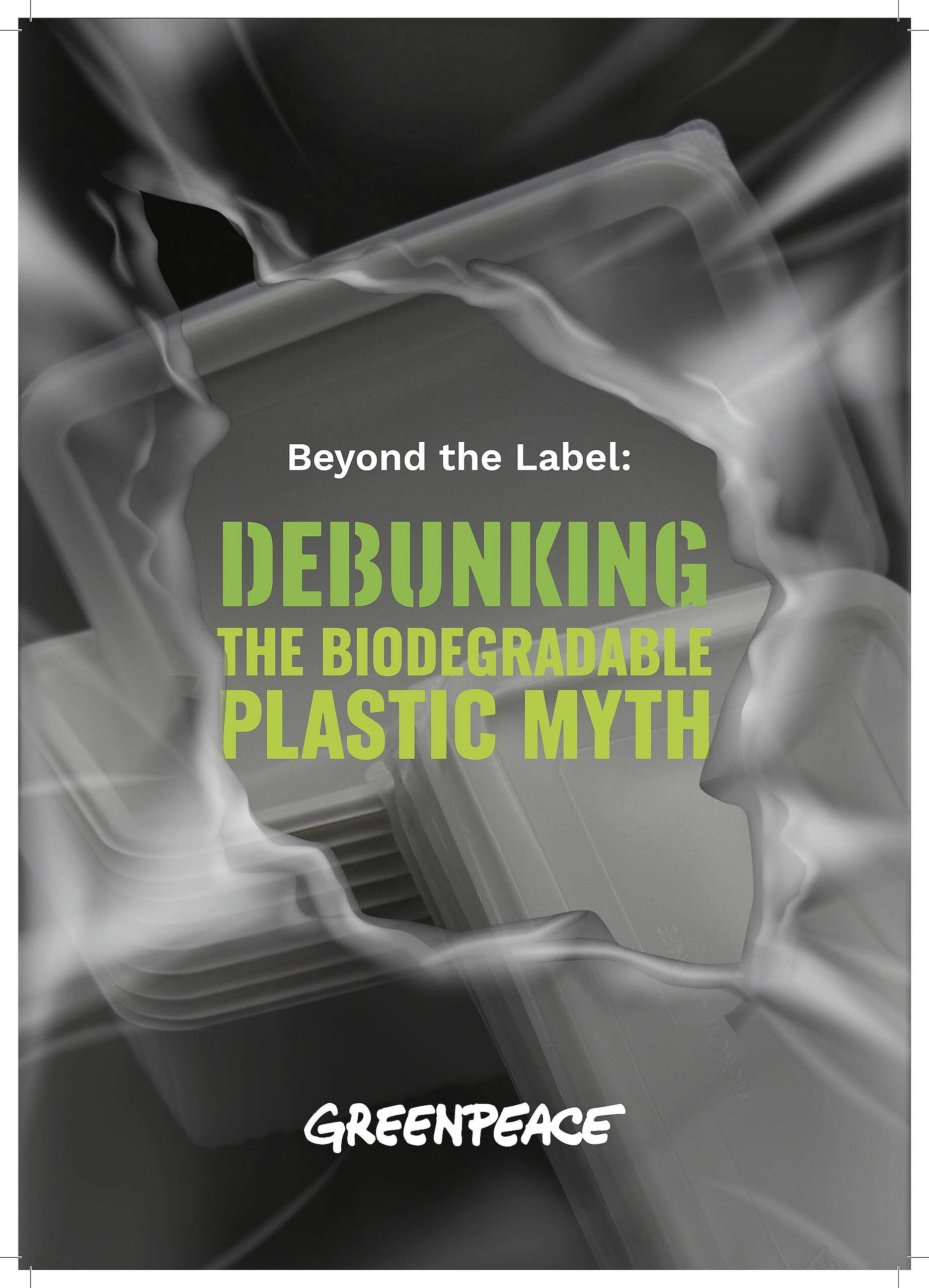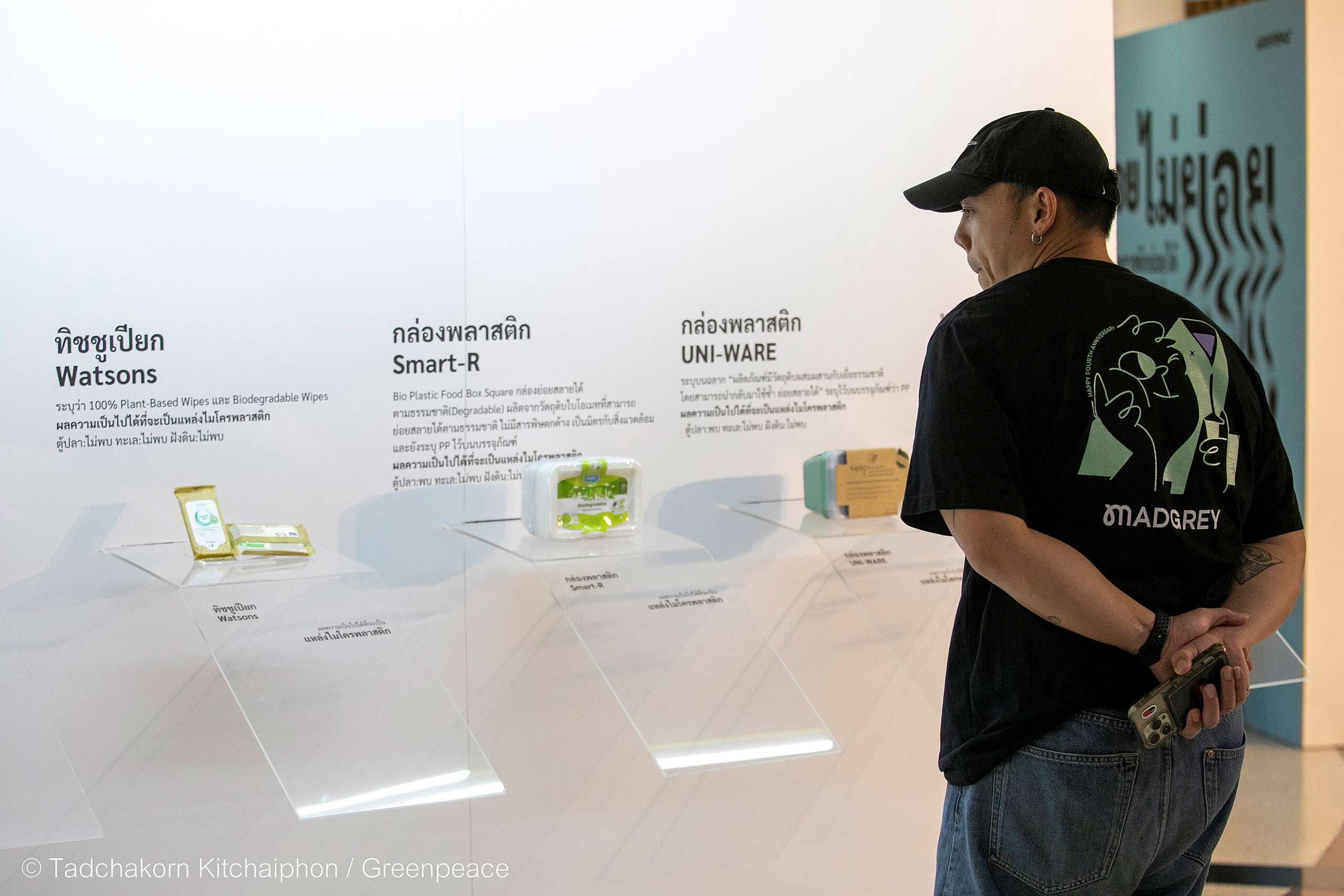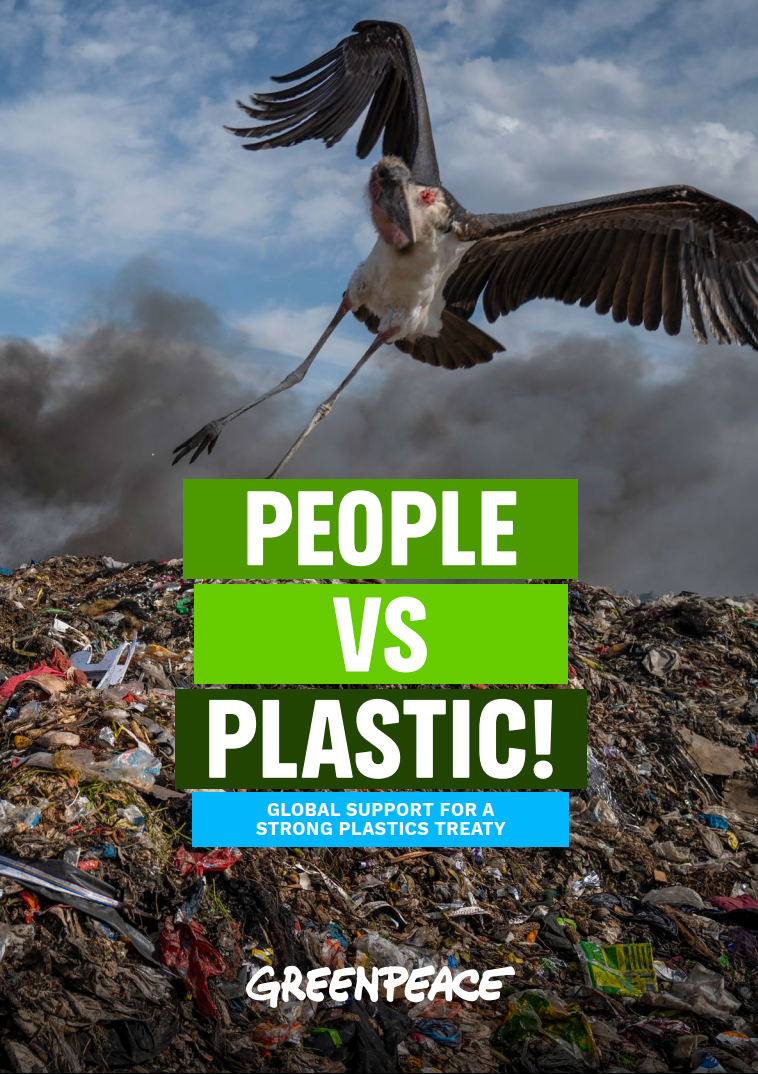Bangkok- Greenpeace Thailand’s latest report “CP’s Plastic Pollution Unmasked”[1] exposes flaws in Charoen Pokphand (CP) Group’s sustainable packaging policy, highlighting insufficient efforts to tackle the plastic pollution crisis. Despite claims of progress, CP’s policy emphasises downstream measures that fall short of addressing the root cause of plastic pollution. With calls for urgent action, Greenpeace Thailand urges the CP group to prioritise the reduction and elimination of plastic packaging in its supply chain if it wants to reach carbon neutrality and net-zero goal.
With a focus on two well-known CP Group companies: CP All Public Co., Ltd. and CPF Public Co., Ltd., Greenpeace Thailand’s latest report evaluated the CP Group’s sustainable packaging policy and its implementation, as described in their 2022 and 2023 sustainability report. The Greenpeace report was released to coincide with Earth Day and the start of the 4th Session of the Intergovernmental Negotiating Committee (INC-4) to develop a global plastic treaty taking place in Ottawa, Canada. Greenpeace has urged businesses and governments to collaborate and support an ambitious and legally binding UN convention to address plastic pollution on both local and global scales.
Greenpeace Thailand began a public campaign on September 29, 2022, targeting CP Group [2] and urging the company to reduce and eventually remove single-use plastic products and packaging from its supply chains. The release of “CP’s Plastic Pollution Unmasked” report serves as a wake-up call for the CP Group to shift its environmental practices in a way that addresses the plastic pollution challenge vigorously and prioritises upstream solutions as well as systems for reduction, reuse, and refill. To protect public interest, advance consumer rights and encourage them to make informed choices about low-carbon products, and raise greater awareness on deceptive marketing tactics such as “greenwashing,” Greenpeace Thailand hopes to disseminate relevant information through this report.
Pichmol Rugrod, Plastic-Free Future Project Leader from Greenpeace Thailand said:
“Although CP Group has taken certain steps to reduce plastic pollution in the wake of our public campaign, it appears that this has not been sufficient. Being one of the leading fast-moving consumer goods (FMCG) companies in Thailand and the world, CP Group needs to demonstrate that it is committed to cutting its plastic footprint by giving customers access to reuse models, bulk refills, or a deposit-and-refund program that eliminates single-use plastic. It’s time for CP Group to take responsibility for the full life cycle of its plastic packaging”
With estimated total sales of 23,000 million baht in 2022 [3], CP Group is the largest food wholesaler and retailer in Thailand. A significant portion of its production and distribution process uses single-use plastic packaging. The 2022 sustainability report [4] states that CP Group produced 125,066 tonnes of plastic packaging, or 10.4% of the 1,197,942 tonnes of plastic packaging generated nationwide [5]. Even in the midst of the COVID-19 pandemic, CP’s business has continued to expand. This demonstrates the Group’s capacity to play a significant role as a stakeholder in solving the plastic pollution crisis.
Launched in 2018, CP’s Sustainable Packaging Policy sets a goal for all of its brands to use only 100% recyclable, compostable, or reusable plastic packaging by 2025 for operations in Thailand and 2030 for international operations.
“Brand audits conducted by Greenpeace Thailand between 2017 and 2021, which were sent annually to CP Group, revealed that Charoen Pokphand Group was the top polluter for several years and ranked among the top five plastic polluters locally responsible for plastic pollution in the environment. Regardless CP’s claims that some of its packaging is recyclable, the consistent results demonstrate that we will be seeing more of CP’s branded plastic packaging in the environment in the absence of a systematic take-back programme to support plastic management and prevent them from leaking into the environment or a post-consumer tracking system to monitor waste disposal routes and actual recycling rates,” Pichmol continued.
The CP Group uses film, sachets/pouches, or bags composed of multiple materials, PS foam trays, and PVC films, among other product packaging types. However, Thailand lacks the necessary infrastructure and management processes to ensure that raw materials may be recycled in accordance with the Resin Identification Codes, so certain raw materials cannot be recycled. Furthermore, food-contaminated packaging cannot be recycled.
CP Group heavily relies on the so-called Waste-to-Energy (WtE) as its primary plastic packaging management. However, this process should not even be considered part of the circular economy as it does not keep materials in the loop but burns them at the end. Burning plastics is toxic and causes air pollution by releasing bottom ash, fly ash, and boiler ash/slag – ash residues that harm people’s health and the environment. These ash residues contain particulate matter that can cause irritation of the airways, dioxin/furan that can increase cancer risk, and heavy metals such as mercury, cadmium, and lead. The burning of plastic releases greenhouse gases which contribute to global warming.
Greenpeace Thailand demands that the CP Group address plastic pollution and that by 2030, the company should:
- Commit to designing and utilising 100% non-plastic or single-use packaging
- Develop the borrow-return system, and initiate a bulk-refill system for consumers seeking absolutely 100% plastic reduction.
- Pledge to reduce its “use of plastic packaging” to the 2018 level
- Refrain from pursuing false solutions such as waste incineration for electricity or manufacturing bioplastic.
Greenpeace also calls on CP Group to urgently tackle plastic pollution by:
- Imposing a ban on plastic bags and straws at all convenience stores operated by CP and all affiliate branches.
- Promoting reuse and refill systems by accepting personal cups and containers
- Taking back all post-consumer plastic packaging to curb plastic leakage into the environment.
- Tracking the quantity of returned plastic waste to calculate external costs and foster innovation to reduce plastic packaging.
Notes:
[1] CP’s Plastic Pollution Unmasked report can be downloaded at https://act.gp/cps-plastic-pollution-unmasked
[2] Letter to CP Group : https://act.gp/the-letter-to-cp
[3] https://datawarehouse.dbd.go.th/index
[4] CP ALL Sustainability Report 2022 can be found at https://www.cpall.co.th/wp-content/uploads/2023/03/CP-ALL-SD-2022.pdf
[5] https://packaging.oie.go.th/new/search_manufacturing_data.php
[6] Greenpeace Thailand’s plastic Brand Audit report: https://act.gp/3U2fXGY
[7] CP ALL Sustainability Report 2023 can be found at https://www.cpall.co.th/wp-content/uploads/2024/03/CP-ALL-SR-2023.pdf
[8] Sign petition to call for CP Group to reduce its single-use plastics: https://act.gp/4cZAip4
For more information:
Wiriya Kingwatcharapong, Communications Manager, Greenpeace Thailand.
Tel: 091-770-3523; E-mail: [email protected]



